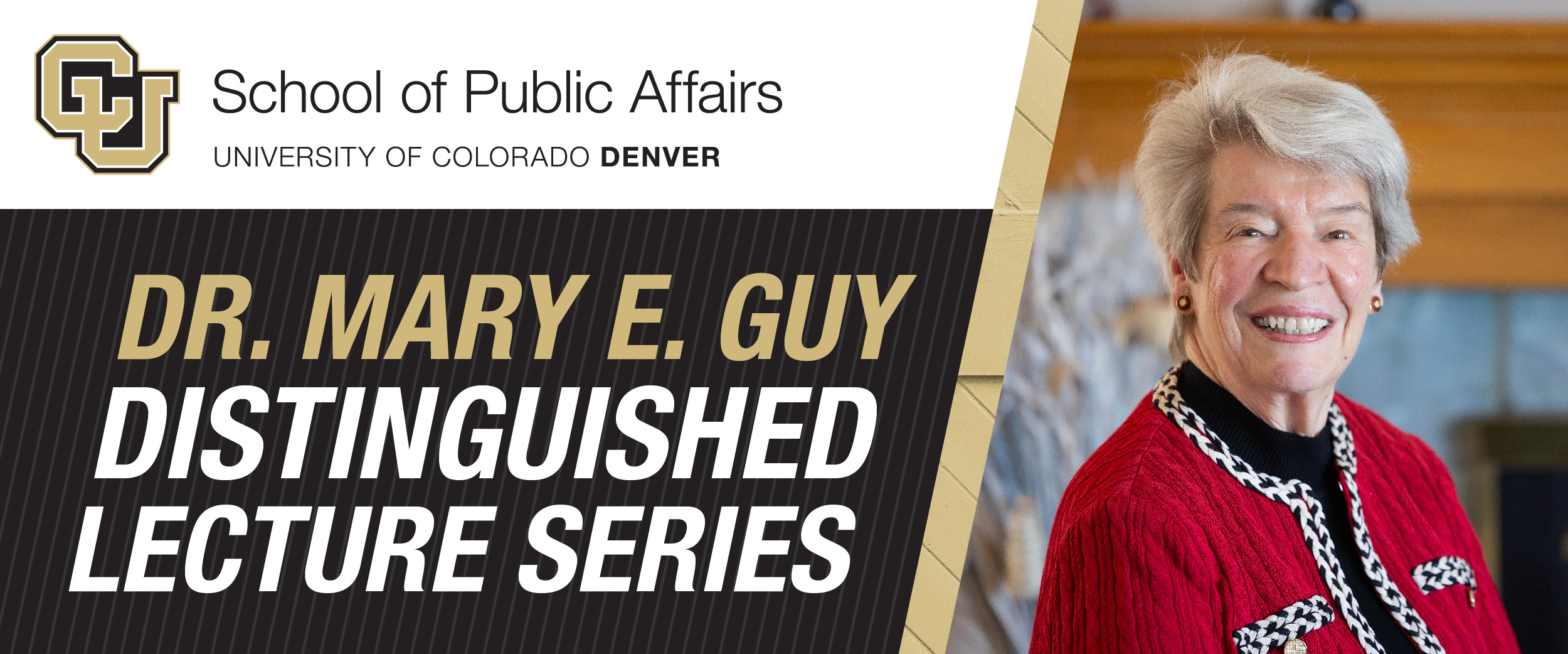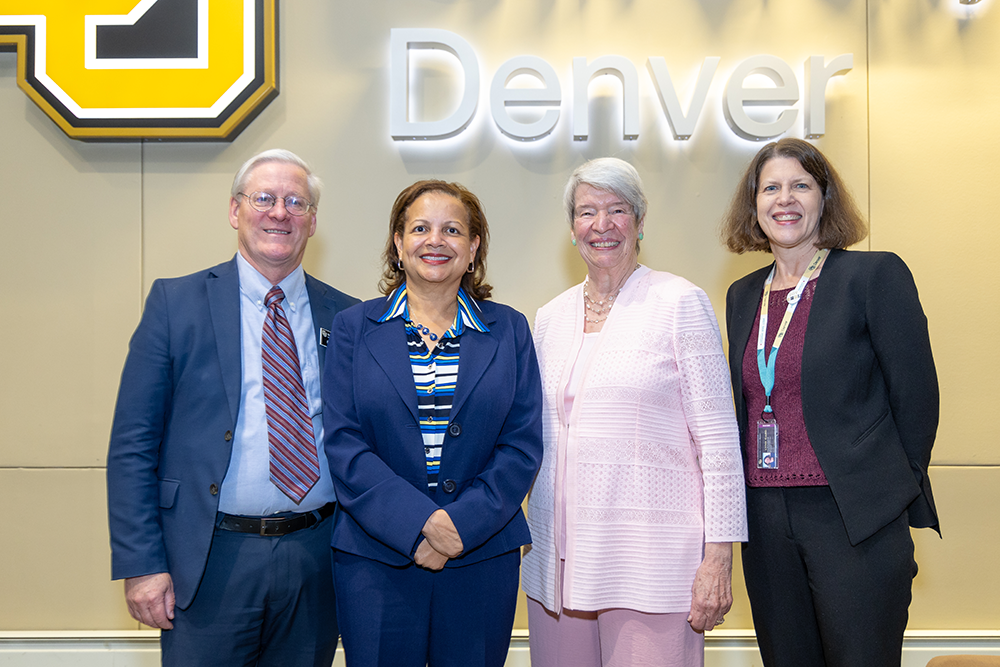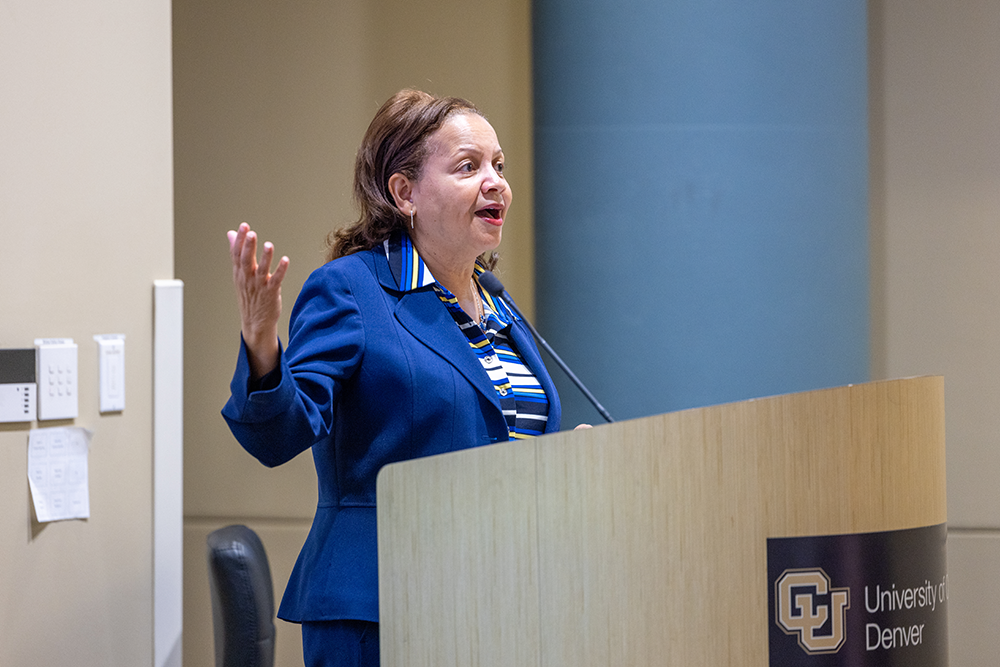Honoring Dr. Mary E. Guy: Insights into the Future of Social Equity at the Inaugural Distinguished Lecture
Dee Dee Flynn | School of Public Affairs Nov 1, 2024
Honoring Dr. Mary E. Guy: Insights into the Future of Social Equity at the Inaugural Distinguished Lecture
Date: October 16, 2024
Time: 5:30-7:00 PM
Location: University of Colorado Denver
The University of Colorado Denver School of Public Affairs proudly hosted the inaugural Dr. Mary E. Guy Distinguished Lecture Series on October 16, 2024. This year’s lecture, titled "The Future of Social Equity," featured Dr. Susan T. Gooden, a prominent scholar and advocate in the field of public affairs, and Dean and Professor at the L. Douglas Wilder School of Government and Public Affairs at Virginia Commonwealth University.

Overview of the Dr Mary E Guy Distinguished Lecture Series
The Dr. Mary E. Guy Distinguished Lecture Series aims to bring together thought leaders and scholars to engage the community in discussions about pressing governance issues. This year, attendees were treated to an insightful presentation from Dr. Gooden, whose work centers on social equity and its implications for policy and governance.
In a conversation before Dean Gooden’s lecture, Guy emphasized the significance of public affairs and the need for vital conversations:
“Public Affairs at large is so much more than just policy. It is so much more than just management. It is so much more than just laws and regulations. It is this incredible chaotic amalgamation of human behavior and how we try to get along, and not get along. It is huge, and so the problems are huge. I don't know what the lecture topic will be 20 years from now, but this year it is social equity. And it absolutely has to be because, my fear is tonight's talk isn't nearly as optimistic as it would have been 5 years ago, but things change. And if we are going to be good scholars, good practitioners, if we are going to enthuse our students about public service, we have got to tackle whatever comes our way and deal with it. And deal with it as best we can. To the degree that this lecture series can help in that regard, such that it brings a foremost scholar to talk about a topic that matters to state agencies, to city governments, to nonprofits, to feds, everywhere, that is what this is about. To the degree that this can help, that is a good thing.”
Dr. Susan Gooden: The Future of Social Equity

Gooden's address was a nod to the distinguished lecture’s namesake, Dr. Mary Ellen Guy. Guy’s Public Administration Evolving: From Foundations to the Future book, co-edited with Mary Ellen Ruben, was completed for the 75th anniversary of American Society for Public Administration (ASPA). It examined 75 years of public affairs, both theoretically and practically. Gooden authored a chapter for the book, entitled “From Equality to Equity.” Looking back at the chapter that she wrote about 10 years ago, Gooden addressed how she would update the book looking at the future of social equity today, drawing on important discussions.
Gooden’s presentation highlighted how the study of social equity has evolved over time and underscored its increasing importance in the policy landscape.
Understanding the Roots of Social Equity: Gooden began by revisiting the origins of social equity, explaining that a historical perspective is crucial for grasping the relevance of equity issues today and their implications for the future. She emphasized that understanding past struggles and milestones in social equity informs not only current approaches but also frames the broader societal and political context in which these issues play out.
Navigating Challenges in Equity Work: Gooden highlighted that one of the biggest challenges in equity work is measuring discrimination. As standards of proof grow more stringent, there’s a risk of focusing too much on data gathering at the expense of implementing solutions, often leading to a disconnect between policy and local needs. Gooden urged scholars and policymakers to balance quantifying equity with taking meaningful action.
The Fourth “E” in Public Administration: Gooden explored the evolution of social equity as an integral element of public administration, alongside the traditional pillars of effectiveness, efficiency, and economy. This advancement reflects the efforts of scholars and advocates who have pushed for equity to be a core component of public service. Gooden's analysis underscored how the acknowledgment of equity as the “fourth E” enriches the field and deepens the impact of public administration work.
Looking Forward: Advancing Social Equity: Addressing the future of social equity, Gooden posed critical questions about its advancement, urging the audience to consider what lies ahead for social equity work. Reflecting on the past few years since her influential chapter, From Equality to Equity, Gooden explored the transformations and progress that have shaped the field, even in the face of significant challenges.
A Pandemic Perspective: Gooden offered a powerful illustration of John Rawls’ “veil of ignorance” theory, applying it to the rapid policy shifts made during the COVID-19 pandemic. Highlighting examples like the expansion of telehealth, shorter incarceration terms, and the rise of drive-up grocery pickup, she showed how prioritizing equity can lead to swift and transformative changes when responding to urgent public needs. Gooden also discussed her team’s impactful work with the Wilder School, where data-driven research played a vital role in Virginia’s equitable vaccine distribution strategy. By helping policymakers prioritize equity in the rollout, her team underscored how data can guide public policy toward fairness and inclusivity, especially in times of crisis.
An Enduring Commitment to Social Equity: Closing with a note of resilience, Gooden acknowledged that today’s social equity landscape may appear less hopeful than in previous decades. However, she encouraged a forward-looking approach, reminding attendees that despite political and social headwinds, opportunities for progress remain. "For people who are committed to the work, we need to think about whatever the political climate is, how do we make the most of the opportunity that is there before us. And how do we continue to make advances in that area?”
Dr. Mary E. Guy Lecture Series Community Impact
Following the lecture, an interactive Q&A session allowed both virtual and in-person attendees to engage directly with Gooden. Participants raised thought-provoking questions about how they can be a leader in the social equity sphere and how they can implement equity-focused policies in local governance, the global lens and how social equity applies globally, how to meet equity needs like the opioid crisis, and with the pushback against DEI: how can leaders and advocates most effectively counter challenges to social equity work.
The event attracted a diverse audience of students, faculty, policymakers, and community members, reflecting the series’ commitment to inclusivity and public engagement. The feedback from attendees highlighted the importance of such discussions in fostering awareness and action toward social equity, and also fostering hope for the future of social equity.
This inaugural Dr. Mary E. Guy Distinguished Lecture Series event set up the series to be a vital platform for dialogue on significant governance issues. We extend our gratitude to Susan Gooden for her enlightening presentation and to everyone who attended. Together, we are making a difference and fostering a community committed to advancing social equity for all.
This event was made possible through the generous support of the Dr. Mary E. Guy Endowed Lectureship Fund, ensuring that these important conversations continue to thrive in our community.
For more information about the annual distinguished lecture series event and other upcoming events, please visit the University of Colorado Denver School of Public Affairs website. You can also view Dr. Susan Gooden’s lecture online at https://www.youtube.com/watch?v=rxBYalw6ofA.
Photo credit: Paul Wedlake, University of Colorado Denver Communications